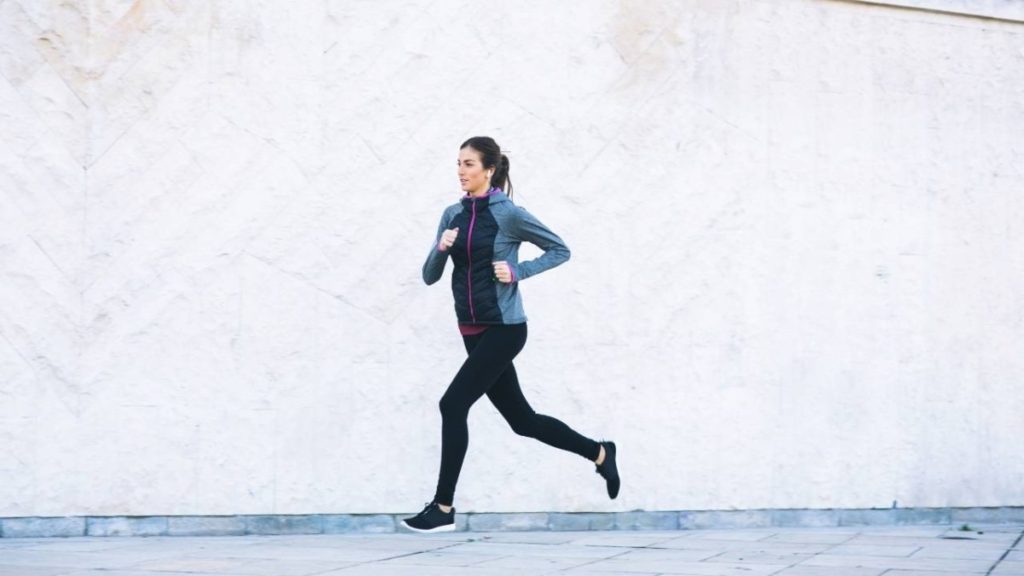
While 9km is somewhat of an odd distance to be running, you have to understand that a lot of people slowly build themselves up to 10km and beyond. Of course, to get there, you have to pass through the 9km barrier. In some cases, a trail near somebody’s home is 9km, so it just makes sense to run that distance.
On average, you can expect most beginners to run 9km in a time of between 50 minutes and 78minutes. For more advanced runners you can estimate a time of 40 minutes. For professional runner its a time of 30 minutes.
Table of Contents
Average 9km Running Time for Females

On average it takes a female between 61 minutes and 78 minutes to run 9km. It depends on their age, weight and overall fitness levels. For instance a female that is aged between 30-34 can expect a 9km running time of 66 minutes. For a female that is aged 45-50 can expect around 69 minutes.
| Average Time to Run 9 km For Females | ||||||
| Age | Beginners | Intermediate | Advanced | |||
| 15-20 | 01:06:00 | 00:45:09 | 00:36:45 | |||
| 20-25 | 01:06:45 | 00:41:15 | 00:36:00 | |||
| 25-30 | 01:06:54 | 00:41:42 | 00:36:36 | |||
| 30-35 | 01:07:12 | 00:42:18 | 00:37:12 | |||
| 35-40 | 01:08:33 | 00:43:48 | 00:38:06 | |||
| 40-45 | 01:09:18 | 00:44:51 | 00:40:03 | |||
| 45-50 | 01:09:36 | 00:45:27 | 00:41:15 | |||
| 50-55 | 01:09:45 | 00:46:57 | 00:42:09 | |||
| 55-60 | 01:16:48 | 00:50:15 | 00:44:15 | |||
| 60-65 | 01:21:18 | 00:54:09 | 00:45:27 | |||

Average 9km Running Time for Males
On average it takes a male between 50 minutes and 70 minutes to run 9km. It depends on their age, weight and overall fitness levels. For instance a male that is aged between 25-29 can expect a 9km running time of54 minutes. For a male that is aged 40-44 can expect about 57 minutes.
| Average Time to Run 9 km For Males | ||||||
| Age | Beginners | Intermediate | Advanced | |||
| 15-20 | 00:54:09 | 00:36:09 | 00:30:36 | |||
| 20-25 | 00:53:15 | 00:37:48 | 00:29:51 | |||
| 25-30 | 00:53:42 | 00:35:24 | 00:30:36 | |||
| 30-35 | 00:54:09 | 00:35:42 | 00:30:54 | |||
| 35-40 | 00:54:45 | 00:35:51 | 00:31:39 | |||
| 40-45 | 00:58:48 | 00:38:24 | 00:34:12 | |||
| 45-50 | 01:00:54 | 00:39:18 | 00:35:15 | |||
| 50-55 | 01:03:45 | 00:44:15 | 00:36:36 | |||
| 55-60 | 01:06:36 | 00:46:12 | 00:41:15 | |||
| 60-65 | 01:12:27 | 00:49:03 | 00:43:48 | |||
Because 9km is such an odd distance to run, there isn’t really a huge amount of data out there that we can share with you. We are going to base our averages here upon average running speeds recorded in some of the most popular apps.
As we mentioned previously, these are intermediate times. Don’t fret if you are new to running and you can’t quite hit those times. It isn’t uncommon for new runners to be 10-20 minutes slower (a couple of minutes per km)
We have broken this list down into ages. This way, you can get a feel for what you should be running at each age. We have made the ‘age gap’ larger later on in this list. This is because as people get older, their times get slower, but they remain fairly consistent.

Other Running Distance You Might Find Helpful
How Many Calories Will You Burn Running 9km?
On average, if you run9km at a 8 minute pre kilometre pace at a speed of 9.6kmph you can expect to burn around 800 calories. The number of calories you burn running 9km will depend on your weight, gender and pace. A person who weighs 200 pounds and runs 9km in 55 minutes will burn about 711 calories. A person who weighs 170 pounds and runs 9km in 55 minutes will burn about 594 calories.
| Weight | Calories Burned For 9km Run |
| 160lbs | 567 calories |
| 170lbs | 594 calories |
| 180lbs | 639 calories |
| 190lbs | 668 calories |
| 200lbs | 711 calories |
| 210lbs | 738 calories |
| 220lbs | 774 calories |
| 230lbs | 819 calories |
| 240lbs | 846 calories |
| 250lbs | 891 calories |
Obviously, there are a lot of factors that can impact how many calories a person can burn while they are running. This means that you should take this section as a general guide. You may burn fewer calories, and you may even burn more. Taller, heavier people will tend to burn more calories when they are running 9km.

Is It Recommended To Run 9km Every Day?
While you should have no issues running 9km every single day, it isn’t something that we would really recommend. Your body does need time to relax every so often. Relaxing is important for our muscles to grow. It is important for our injuries to heal. If you are running every single day, then we can assure you that you are going to be far more prone to injuries caused by your running.
We suggest that you run 9km a maximum of 5 times per week. Take a couple of non-consecutive days off. If you want to still run on those days, then do shorter distances. Maybe don’t stretch beyond 3km.
What’s the best investment you could make in your running performance? To discover the exact running gear and why it has significantly improved my running, read this post.
Tips For Running Further
Looking to bump yourself up to running 9km distances? Looking to boost your 9km distance? Let’s wrap up by sharing a few tips that we genuinely believe will help you to run much further while you are out there.
1. Build Up Your Distance Slowly
You aren’t going to be hitting 9km right away, especially if you haven’t run all that much before. Most people try and add a couple of km to their distance every month, although nobody would begrudge you if you were only able to add 1km a month to your distance. This is fine. Take things slowly. Make sure that you are comfortable with running a certain distance before you take the plunge and run further.
2. Hydrate Yourself
You aren’t going to be running massive distances unless you hydrate yourself. Keep a bottle of water on you during your run. Drink 1 liter every hour (don’t drink more than this!). Take small sips every now and then.
Don’t be afraid to take a break or two from running to have a sip. Again, your goal is to take things slowly and gradually build yourself up to those larger distances. It is fine to rest for a minute or two. It will help.
3. Get a Decent Pair of Running Shoes
You will be surprised at how much a decent pair of running shoes can help when you are covering larger distances. Running shoes are designed to protect your feet and legs from injuries. They will provide you with a much more comfortable run. There is a reason why you don’t see long-distance runners wearing a tatty pair of shoes that they picked up from a thrift store!
4. Establish Correct Form
Head up and facing forward. Your back should be straight, and your shoulders relaxed. If you are going anything different from this when you are running, then you are just making life much more difficult than it needs to be.
5. Run Slower
When you are boosting your distance, don’t worry too much on time. Focusing on getting to your distance target. Run slower during those early kilometers, even if you know that you are able to run faster. If you can do that, then you are much less likely to tire yourself out, and you are much more likely to hit whatever distance target you have in mind.
Average Time to Run 9 km Summary
Running 9km will take the average intermediate runner just shy of an hour. Depending on your gender, weight, and size, you should be burning about 60km for every kilometer that you run. While you can run 9km every single day, we don’t really recommend it. Have a little break every now and then. We can assure you that your body will thank you for it!



